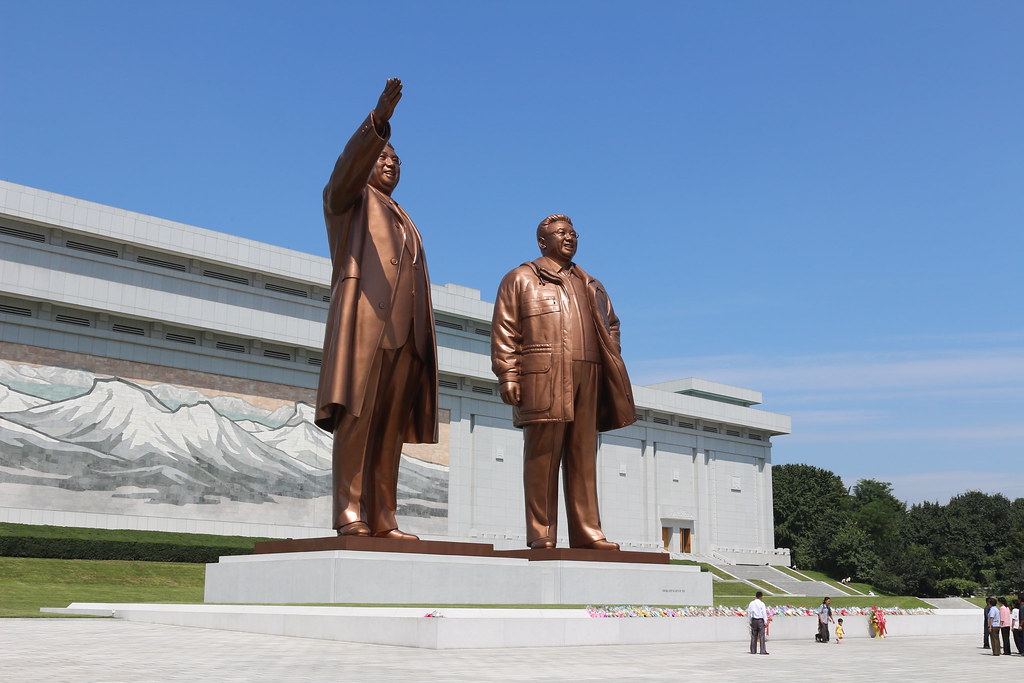Special to WorldTribune.com
UNITED NATIONS — Attempting to revive political links with Russia, endeavoring to break the “Big Brother” syndrome with China, and seeking diplomatic standing after its failed summit with the USA, North Korean dictator Kim Jong-Un met with Vladimir Putin. The meeting in the gritty Far Eastern port of Vladivostok was Pyongyang’s attempt to reestablish formerly close ties with Moscow and to counterbalance Beijing’s powerful grip on North Korean policy.
Historically Imperial Russia, then the former Soviet Union, and now Putin’s revived Russia maintained close ties and clearly wider policy aspirations towards Korea. During the 19th century, Russian influence grew in the northern part of the peninsula and calibrated its East Asian policies to counterbalance a rising Japan as well as China. Yet it was Japan that would control Korea for a generation.

But the end of WWII saw the Korean map arbitrarily redrawn as a divided nation. Following Japan’s surrender, the Soviet army occupied what is now North Korea while a full month later American forces under General John Hodge’s XXIV Corps moved into the South. Korea was thus occupied by the Russians and the U.S. until two separate states were established in 1948.
Kim Il-Sung, the grandfather of the current ruler Kim Jong-Un, was after all, selected by Stalin to lead what became the quaintly titled “Democratic People’s Republic of Korea,” DPRK. In the period after the Korean war, both the Soviet Union and People’s China vied for the allegiance of the North Korean state. Correspondingly, Kim Il-Sung played both communist giants off against each other to gain support for the fledgling DPRK.
By the 1980’s North Korea was much closer to the Soviets than it was to Deng Xiaoping’s reformist China. Thus the revived Russian links are logical politically and ideologically as much as a natural move by Kim to curry favor with a neighboring country. Soviet weapons and aid poured into the DPRK until the collapse of the USSR.
China’s historic “big brother” attitude towards Korea and Beijing’s powerful business status in both North and South Korea has largely checkmated any direct Russian role. Nonetheless, both China and Russia as veto holding members of the UN Security Council hold decisive cards over the divided peninsula, especially as geopolitical arbiters.
North Korea’s nuclear proliferation has turned the former “hermit kingdom” into a rogue nation on the global stage. While China has cautiously maintained “comradely” ties with the DPRK and still serves as a conduit for 93 percent of its trade, Xi Jinping is nonetheless nervous about any clash between a bellicose Kim Jong-Un and the USA. Beijing knows that any regional conflict sparked by Kim would cause devastating collateral damage to China.
Thus Big Brother in Beijing has didactically lectured Kim to negotiate with the USA to defuse the looming nuclear confrontation. Significantly the Summits between President Donald Trump and the North Korean leader in Singapore and Hanoi were the first steps to serious negotiations; they stopped the clock on North Korean nuclear testing and missile launches.
Though Kim feels miffed by China and spurned by the USA, enter Vladimir Putin to perhaps play the role of deal maker or spoiler.
Kim’s armored train rolled into Vladivostok for his first ever meeting with his Russian counterpart. Indeed both leaders, facing ostracism and economic sanctions, looked to the
Summit as a diplomatic breakthrough. Kim Jong-Un told Putin he hoped his trip would “further solidify relations between the two countries with a long history and tradition of friendship.”
Clearly Putin’s Russia holds a certain ideological provenance for North Korea.
Currently Russian trade and aid to North Korea are minimal given tough UN sanctions, it’s highly unlikely that Moscow is able to legally expand commercial ties. Nonetheless North Korea’s suffocating economic sanctions, could be loosened through Moscow’s lobbying.
Vladimir Putin told Kim, “We welcome your efforts to develop an inter-Korean dialogue and normalize North Korea’s relations with the United States.” Undeniably the Russian leader. postures to be viewed as a serious player in East Asian policy. Putin added that DPRK nuclear disarmament needs international guarantees and cited a multilateral diplomatic process.
Still the Vladivostok summit reflected style over substance; high profile bearhugs and bonhomie but little serious breakthroughs.
Though the Russians favor reviving the moribund Six Party talks in which the two Korean states, China, Russia, the USA and Japan would negotiate a disarmament deal with the DPRK, there’s likely more momentum now for a comprehensive South Korean/U.S. settlement with the North.
That’s of course presuming Pyongyang accepts serious overtures.
John J. Metzler is a United Nations correspondent covering diplomatic and defense issues. He is the author of Divided Dynamism the Diplomacy of Separated Nations: Germany, Korea, China (2014). [See pre-2011 Archives]

 By
By